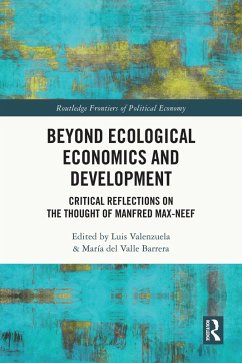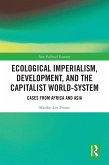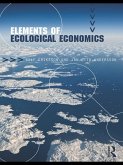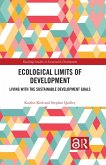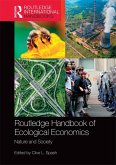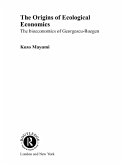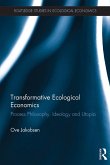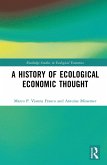Beyond Ecological Economics and Development (eBook, ePUB)
Critical Reflections on the Thought of Manfred Max-Neef
Redaktion: Valenzuela, Luis; del Valle Barrera, María
41,95 €
41,95 €
inkl. MwSt.
Sofort per Download lieferbar

21 °P sammeln
41,95 €
Als Download kaufen

41,95 €
inkl. MwSt.
Sofort per Download lieferbar

21 °P sammeln
Jetzt verschenken
Alle Infos zum eBook verschenken
41,95 €
inkl. MwSt.
Sofort per Download lieferbar
Alle Infos zum eBook verschenken

21 °P sammeln
Beyond Ecological Economics and Development (eBook, ePUB)
Critical Reflections on the Thought of Manfred Max-Neef
Redaktion: Valenzuela, Luis; del Valle Barrera, María
- Format: ePub
- Merkliste
- Auf die Merkliste
- Bewerten Bewerten
- Teilen
- Produkt teilen
- Produkterinnerung
- Produkterinnerung

Bitte loggen Sie sich zunächst in Ihr Kundenkonto ein oder registrieren Sie sich bei
bücher.de, um das eBook-Abo tolino select nutzen zu können.
Hier können Sie sich einloggen
Hier können Sie sich einloggen
Sie sind bereits eingeloggt. Klicken Sie auf 2. tolino select Abo, um fortzufahren.

Bitte loggen Sie sich zunächst in Ihr Kundenkonto ein oder registrieren Sie sich bei bücher.de, um das eBook-Abo tolino select nutzen zu können.
The interrelationship between development, environment and human needs is one of the key issues facing the word today. The Chilean economist, Manfred Max-Neef, was a leading thinker on this dynamic and this book provides both an introduction to and analysis of his work and ideas.
- Geräte: eReader
- mit Kopierschutz
- eBook Hilfe
Andere Kunden interessierten sich auch für
![Ecological Imperialism, Development, and the Capitalist World-System (eBook, ePUB) Ecological Imperialism, Development, and the Capitalist World-System (eBook, ePUB)]() Mariko Lin FrameEcological Imperialism, Development, and the Capitalist World-System (eBook, ePUB)42,95 €
Mariko Lin FrameEcological Imperialism, Development, and the Capitalist World-System (eBook, ePUB)42,95 €![Elements of Ecological Economics (eBook, ePUB) Elements of Ecological Economics (eBook, ePUB)]() Jan Otto AnderssonElements of Ecological Economics (eBook, ePUB)66,95 €
Jan Otto AnderssonElements of Ecological Economics (eBook, ePUB)66,95 €![Ecological Limits of Development (eBook, ePUB) Ecological Limits of Development (eBook, ePUB)]() Kaitlin KishEcological Limits of Development (eBook, ePUB)0,00 €
Kaitlin KishEcological Limits of Development (eBook, ePUB)0,00 €![Routledge Handbook of Ecological Economics (eBook, ePUB) Routledge Handbook of Ecological Economics (eBook, ePUB)]() Routledge Handbook of Ecological Economics (eBook, ePUB)50,95 €
Routledge Handbook of Ecological Economics (eBook, ePUB)50,95 €![The Origins of Ecological Economics (eBook, ePUB) The Origins of Ecological Economics (eBook, ePUB)]() Kozo MayumiThe Origins of Ecological Economics (eBook, ePUB)54,95 €
Kozo MayumiThe Origins of Ecological Economics (eBook, ePUB)54,95 €![Transformative Ecological Economics (eBook, ePUB) Transformative Ecological Economics (eBook, ePUB)]() Ove JakobsenTransformative Ecological Economics (eBook, ePUB)44,95 €
Ove JakobsenTransformative Ecological Economics (eBook, ePUB)44,95 €![A History of Ecological Economic Thought (eBook, ePUB) A History of Ecological Economic Thought (eBook, ePUB)]() Marco P. Vianna FrancoA History of Ecological Economic Thought (eBook, ePUB)42,95 €
Marco P. Vianna FrancoA History of Ecological Economic Thought (eBook, ePUB)42,95 €-
-
-
The interrelationship between development, environment and human needs is one of the key issues facing the word today. The Chilean economist, Manfred Max-Neef, was a leading thinker on this dynamic and this book provides both an introduction to and analysis of his work and ideas.
Dieser Download kann aus rechtlichen Gründen nur mit Rechnungsadresse in A, B, BG, CY, CZ, D, DK, EW, E, FIN, F, GR, HR, H, IRL, I, LT, L, LR, M, NL, PL, P, R, S, SLO, SK ausgeliefert werden.
Produktdetails
- Produktdetails
- Verlag: Taylor & Francis eBooks
- Seitenzahl: 276
- Erscheinungstermin: 25. August 2023
- Englisch
- ISBN-13: 9781000934441
- Artikelnr.: 68372263
- Verlag: Taylor & Francis eBooks
- Seitenzahl: 276
- Erscheinungstermin: 25. August 2023
- Englisch
- ISBN-13: 9781000934441
- Artikelnr.: 68372263
- Herstellerkennzeichnung Die Herstellerinformationen sind derzeit nicht verfügbar.
Luis Valenzuela-Rivera is an assistant professor at the Institute of Economics of the Austral University of Chile. He holds a PhD in Economics from the University of Oxford, as well as a Master's degree in Economics from the University of Oxford and the Pontificia Universidad Católica de Chile. His areas of interest are inequality, technological change, productivity, and the labour market, in addition to the philosophy and methodology of economics. He is an associate member of the Institute for New Economic Thinking at the University of Oxford and adjunct researcher at the Millennium Nucleus on the Evolution of Work (M-NEW). He has been a consultant for the World Economic Forum and advisor of different agencies at the Government of Chile. María del Valle Barrera is an adjunct professor at the Institute of Economics of the Austral University of Chile. She holds a Master's degree in Rural Development from Austral University of Chile and a PhD in Political Science from Universidad de Cuyo in Argentina. She teaches at the Master's Programme in Human Scale Development and Ecological Economics at Austral University of Chile. She worked with late Prof. Max-Neef on several projects since 2001, and has specialised in participatory processes of sustainable development and community engagement. As a UNDP consultant, María has worked on energy poverty, climate change, and local governments.
1. Introduction 2. Short biography of Manfred Max-Neef PART I: Human needs
and well-being 3. On the contributions of Max-Neef et al. to the theory of
human needs. Julio Boltvinik 4. Understanding Max-Neef's model of human
needs as a practical toolkit for supporting development work and societal
transitions. Des Gasper 5. A New Development Paradigm Based on Happiness
and Well-being: Max-Neef's Contributions for Building a Better World.
Wenceslao Unanue 6. The Human Scale Development approach: is 'spirituality'
a fundamental human need? Felix Fuders 7. Addressing fundamental human
needs: exploring the Human Scale Development proposal for governance and
policymaking. María del Valle Barrera & Patricio Belloy PART II:
Development, growth and sustainability 8. Overcoming the development
discourse: Max-Neef and economic growth. Antonio Elizalde Hevia 9. How
Human Scale Development can help to achieve the Sustainable Development
Goals for the 2030 Agenda. Ivonne Cruz 10. Climate change and planetary
boundaries: an overview from the biocentric perspective of Max-Neef. Clara
Olmedo, Iñaki Ceberio de León & Yerko Castillo Ávalos 11. Demand-side,
socio-cultural and systemic solutions: the contributions of Max-Neef's work
for climate change and sustainability. Lina Brand-Correa 12. Human Scale
Sustainable Development: where Max-Neef's Fundamental Human Needs meet
Sustainability. Gibrán Vita 13. Economic growth and well-being: examining
Max-Neef's 'Threshold Hypothesis'. Luis Valenzuela-Rivera PART III:
Methodology of economics 14. The Thinking of Manfred Max-Neef and the
Challenge to Neoclassic Economics and Policy Orthodoxy. Andrés Solimano
15. The Gustibulus est Disputandum: building a bridge between mainstream
economics and Max-Neef's theory of fundamental needs. Roberto Pastén 16.
Manfred Max-Neef and heterodox economics: influences, and links with Piero
Sraffa. Jean Pierre Doussoulin & Yoann Verger 17. The Methodology of
Barefoot Economics. Patrick Kletzka 18. Max-Neef's complete biography
and well-being 3. On the contributions of Max-Neef et al. to the theory of
human needs. Julio Boltvinik 4. Understanding Max-Neef's model of human
needs as a practical toolkit for supporting development work and societal
transitions. Des Gasper 5. A New Development Paradigm Based on Happiness
and Well-being: Max-Neef's Contributions for Building a Better World.
Wenceslao Unanue 6. The Human Scale Development approach: is 'spirituality'
a fundamental human need? Felix Fuders 7. Addressing fundamental human
needs: exploring the Human Scale Development proposal for governance and
policymaking. María del Valle Barrera & Patricio Belloy PART II:
Development, growth and sustainability 8. Overcoming the development
discourse: Max-Neef and economic growth. Antonio Elizalde Hevia 9. How
Human Scale Development can help to achieve the Sustainable Development
Goals for the 2030 Agenda. Ivonne Cruz 10. Climate change and planetary
boundaries: an overview from the biocentric perspective of Max-Neef. Clara
Olmedo, Iñaki Ceberio de León & Yerko Castillo Ávalos 11. Demand-side,
socio-cultural and systemic solutions: the contributions of Max-Neef's work
for climate change and sustainability. Lina Brand-Correa 12. Human Scale
Sustainable Development: where Max-Neef's Fundamental Human Needs meet
Sustainability. Gibrán Vita 13. Economic growth and well-being: examining
Max-Neef's 'Threshold Hypothesis'. Luis Valenzuela-Rivera PART III:
Methodology of economics 14. The Thinking of Manfred Max-Neef and the
Challenge to Neoclassic Economics and Policy Orthodoxy. Andrés Solimano
15. The Gustibulus est Disputandum: building a bridge between mainstream
economics and Max-Neef's theory of fundamental needs. Roberto Pastén 16.
Manfred Max-Neef and heterodox economics: influences, and links with Piero
Sraffa. Jean Pierre Doussoulin & Yoann Verger 17. The Methodology of
Barefoot Economics. Patrick Kletzka 18. Max-Neef's complete biography
1. Introduction 2. Short biography of Manfred Max-Neef PART I: Human needs
and well-being 3. On the contributions of Max-Neef et al. to the theory of
human needs. Julio Boltvinik 4. Understanding Max-Neef's model of human
needs as a practical toolkit for supporting development work and societal
transitions. Des Gasper 5. A New Development Paradigm Based on Happiness
and Well-being: Max-Neef's Contributions for Building a Better World.
Wenceslao Unanue 6. The Human Scale Development approach: is 'spirituality'
a fundamental human need? Felix Fuders 7. Addressing fundamental human
needs: exploring the Human Scale Development proposal for governance and
policymaking. María del Valle Barrera & Patricio Belloy PART II:
Development, growth and sustainability 8. Overcoming the development
discourse: Max-Neef and economic growth. Antonio Elizalde Hevia 9. How
Human Scale Development can help to achieve the Sustainable Development
Goals for the 2030 Agenda. Ivonne Cruz 10. Climate change and planetary
boundaries: an overview from the biocentric perspective of Max-Neef. Clara
Olmedo, Iñaki Ceberio de León & Yerko Castillo Ávalos 11. Demand-side,
socio-cultural and systemic solutions: the contributions of Max-Neef's work
for climate change and sustainability. Lina Brand-Correa 12. Human Scale
Sustainable Development: where Max-Neef's Fundamental Human Needs meet
Sustainability. Gibrán Vita 13. Economic growth and well-being: examining
Max-Neef's 'Threshold Hypothesis'. Luis Valenzuela-Rivera PART III:
Methodology of economics 14. The Thinking of Manfred Max-Neef and the
Challenge to Neoclassic Economics and Policy Orthodoxy. Andrés Solimano
15. The Gustibulus est Disputandum: building a bridge between mainstream
economics and Max-Neef's theory of fundamental needs. Roberto Pastén 16.
Manfred Max-Neef and heterodox economics: influences, and links with Piero
Sraffa. Jean Pierre Doussoulin & Yoann Verger 17. The Methodology of
Barefoot Economics. Patrick Kletzka 18. Max-Neef's complete biography
and well-being 3. On the contributions of Max-Neef et al. to the theory of
human needs. Julio Boltvinik 4. Understanding Max-Neef's model of human
needs as a practical toolkit for supporting development work and societal
transitions. Des Gasper 5. A New Development Paradigm Based on Happiness
and Well-being: Max-Neef's Contributions for Building a Better World.
Wenceslao Unanue 6. The Human Scale Development approach: is 'spirituality'
a fundamental human need? Felix Fuders 7. Addressing fundamental human
needs: exploring the Human Scale Development proposal for governance and
policymaking. María del Valle Barrera & Patricio Belloy PART II:
Development, growth and sustainability 8. Overcoming the development
discourse: Max-Neef and economic growth. Antonio Elizalde Hevia 9. How
Human Scale Development can help to achieve the Sustainable Development
Goals for the 2030 Agenda. Ivonne Cruz 10. Climate change and planetary
boundaries: an overview from the biocentric perspective of Max-Neef. Clara
Olmedo, Iñaki Ceberio de León & Yerko Castillo Ávalos 11. Demand-side,
socio-cultural and systemic solutions: the contributions of Max-Neef's work
for climate change and sustainability. Lina Brand-Correa 12. Human Scale
Sustainable Development: where Max-Neef's Fundamental Human Needs meet
Sustainability. Gibrán Vita 13. Economic growth and well-being: examining
Max-Neef's 'Threshold Hypothesis'. Luis Valenzuela-Rivera PART III:
Methodology of economics 14. The Thinking of Manfred Max-Neef and the
Challenge to Neoclassic Economics and Policy Orthodoxy. Andrés Solimano
15. The Gustibulus est Disputandum: building a bridge between mainstream
economics and Max-Neef's theory of fundamental needs. Roberto Pastén 16.
Manfred Max-Neef and heterodox economics: influences, and links with Piero
Sraffa. Jean Pierre Doussoulin & Yoann Verger 17. The Methodology of
Barefoot Economics. Patrick Kletzka 18. Max-Neef's complete biography
